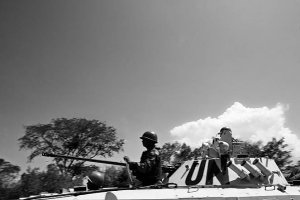Interview with Bulambo and French-English translation: Charlotte Castadot. Original story here.
On 2 November 2008 the Rafto Prize for Human Rights was awarded to pastor Bulambo Lembelembe Josué from the Democratic Republic of the Congo (DR Congo).
Media quiet
Last year the media reported daily about the harsh realities of gang rapes and slaughter of civilians in the Southern part of the country.
Pastor Bulambo was honoured for his efforts for reconciliation and peace in the region.
One year later, the media is palpably quieter on the DR Congo issue. However, as indicated by a Human Rights Watch report published 2 November 2009, the security of the people in the Kivu region is still constantly at risk.
The aftermath of a genocide
The plight of the Congolese people is in many ways connected to the genocide that took place in Rwanda in 1994. The refugees and perpetrators moved into the neighbouring country, which paved the way for the Democratic Forces for the Liberation of Rwanda (FDLR).
This rebel group is responsible for cruel attacks on civilians, especially women, who are victims of the group’s sexualized violence, as gangs of soldiers attack and rape girls and women walking outdoors or even kidnap them from their homes. In some instances rebel forces massacre entire villages.
 “However, the military operations [mandated to hunt FDLR soldiers] lead to more insecurity for civilians”, says pastor Bulambo. “It also disrupted the leadership of the rebels, as they had to move fast and disappear into the jungle. Therefore, it’s much more difficult for our field workers to contact them now”.
“However, the military operations [mandated to hunt FDLR soldiers] lead to more insecurity for civilians”, says pastor Bulambo. “It also disrupted the leadership of the rebels, as they had to move fast and disappear into the jungle. Therefore, it’s much more difficult for our field workers to contact them now”.
Facilitating return to Rwanda
As Vice President of the Eglise du Christ au Congo (ECC) he organises field workers trying to contact FDLR soldiers.
The field workers inform about demobilisation programs and help those who wish to quit the rebel forces. ECC are in contact with both the Congolese army, the UN peacekeeping force (MONUC) and the High Commissioner for Refugees.
”We want to help them go back to Rwanda”, says Bulambo. “Many of the soldiers want to lay down arms but are afraid to do so because the Rwandan state cannot assure their safety if they return”.
Joint military operation to disarm rebels
In the last year, Congolese government forces and the UN peacekeeping force have cooperated in a joint operation to demilitarise the FDLR. In spite of disarming 1,243 FDLR combatants from an estimated strength of 6,000, the FDLR continues to recruit and its ability to attack civilians remains intact. In fact, the operation has made the FDLR more aggressive towards civilians and increasingly inaccessible to field workers from the ECC.
“It has made our work much more complicated”, claims pastor Bulambo. ”In addition, the UN force MONUC is failing in its primary mandate: to protect civilians. MONUC is clearly not effective enough and violence against civilians continues. The international community should strengthen the MONUC troops in order to make them effective”.
Critique on war crimes
Human Rights Watch gives other reasons for criticising the Congolese UN operation.
As recently as August and September this year the government forces were involved in two massacres killing over 50 civilians in the villages of Nyabiondo and Ndoruma. The UN did not interfere, and only ended its partnership with the army after being criticised by the human rights organisation.
were involved in two massacres killing over 50 civilians in the villages of Nyabiondo and Ndoruma. The UN did not interfere, and only ended its partnership with the army after being criticised by the human rights organisation.
”These incidents illustrate how civilians in the Kivu region have every reason to fear men in uniform, whether from the FDLR, the Congolese army, the UN or other local fractions”, comments Norwegian missionary and senior researcher in the Centre for Intercultural Communication (SIK), Kåre Lode.
Between refugees and perpetrators
In spite of war crimes committed by all military parties, pastor Bulambo insists that we keep a nuanced picture of the soldiers.
”We have to differentiate between the FDLR soldiers that carried out the 1994 Rwandan genocide, and the others. Some of them were simple refugees in DR Congo, and entered the FDLR without having carried out the 1994 Rwandan genocide. Giving them an internationally recognised status as refugees could help them start a new life in either DR Congo or Rwanda. As for the soldiers responsible for the Rwandan genocide, we want to help ensure their arrest and subsequent legal prosecution”.
International lobbying
Different international parties are involved in the demobilisation task of the FLDR.
Kåre Lode is involved in a peace project financed by the Norwegian Ministry of Foreign Affairs. He gives insights into internal talks between FDLR military and political leaders in DR Congo and political leaders in Europe, USA and Canada.
A network of Christian and humanitarian organisations lobby political leaders outside DR Congo. Their stance is that the UN Convention on Refugees should be at the heart of the demobilisation process. A big international focus is also necessary for the involved parties to feel safe.
Pastor Bulambo Lembelembe Josué claims that a military operation is not a good solution to the problems in eastern Congo. ”We need dialogue, so support and time from the international community is crucial”.
Sources: Human Rights Watch, Forsvarets Forum, Kåre Lode, Aftenposten 4.11.09





